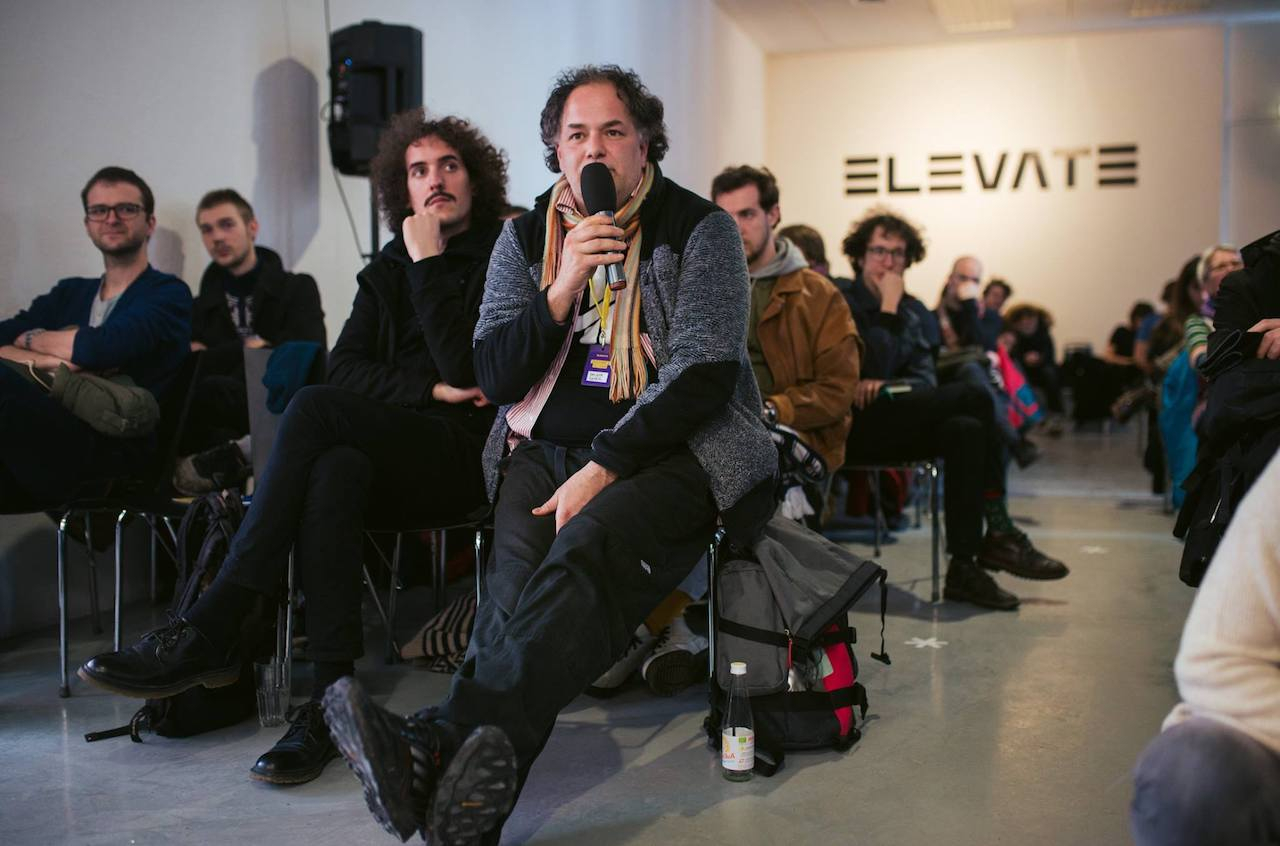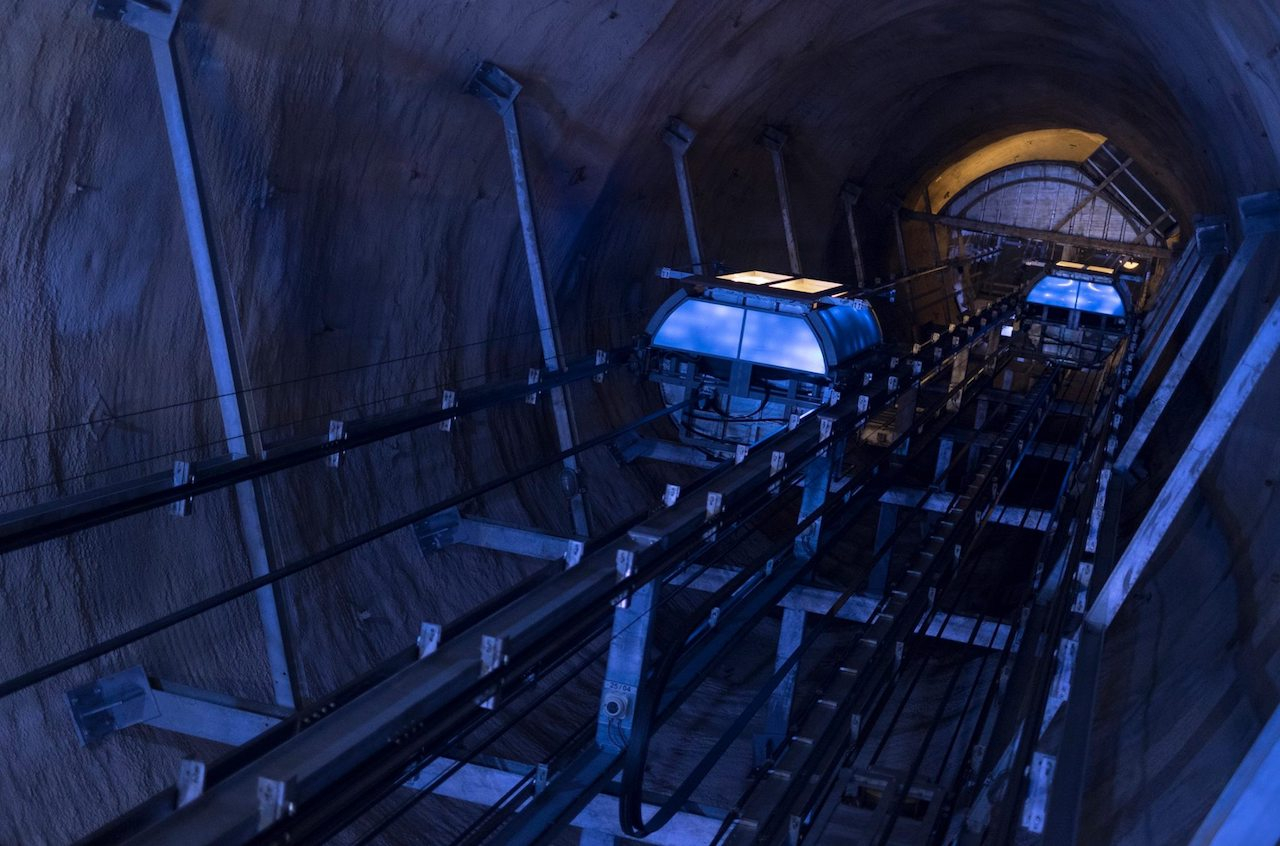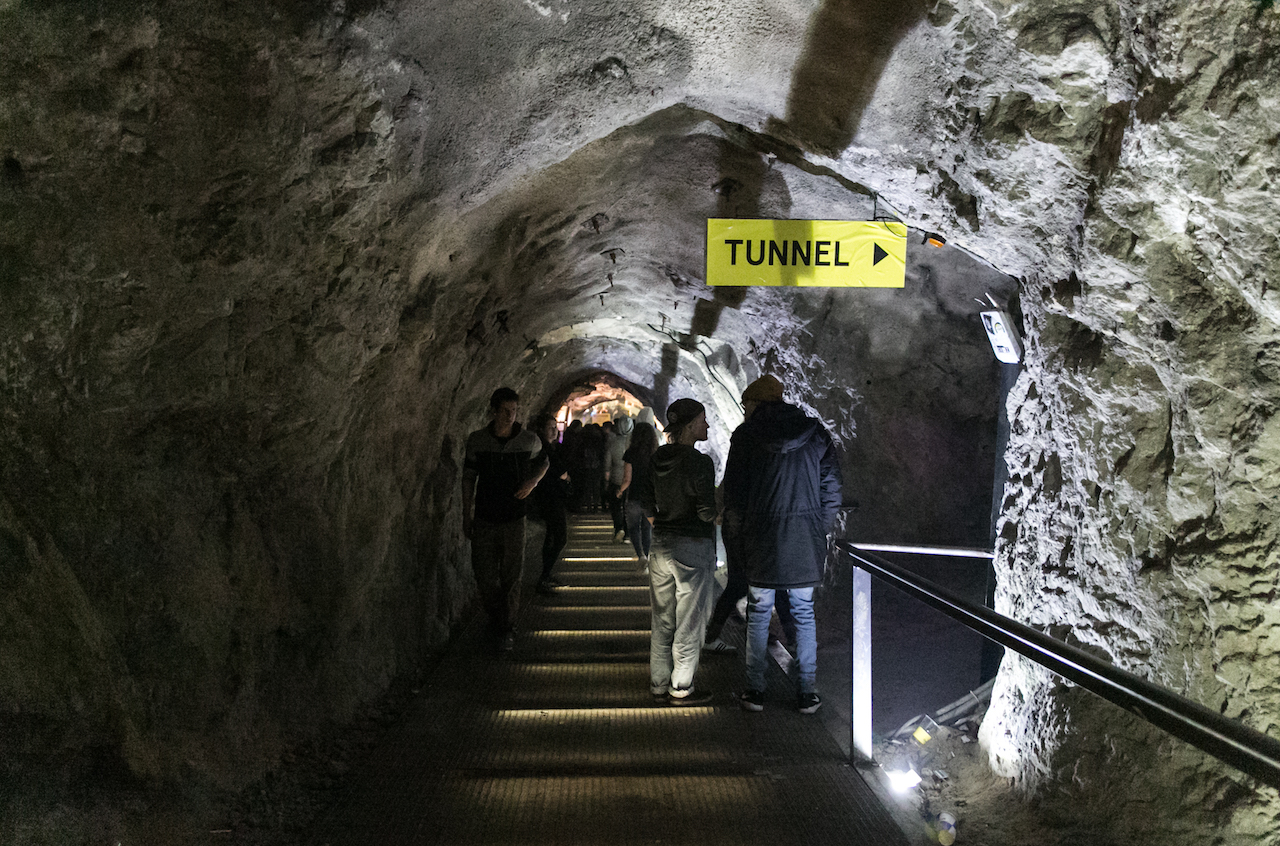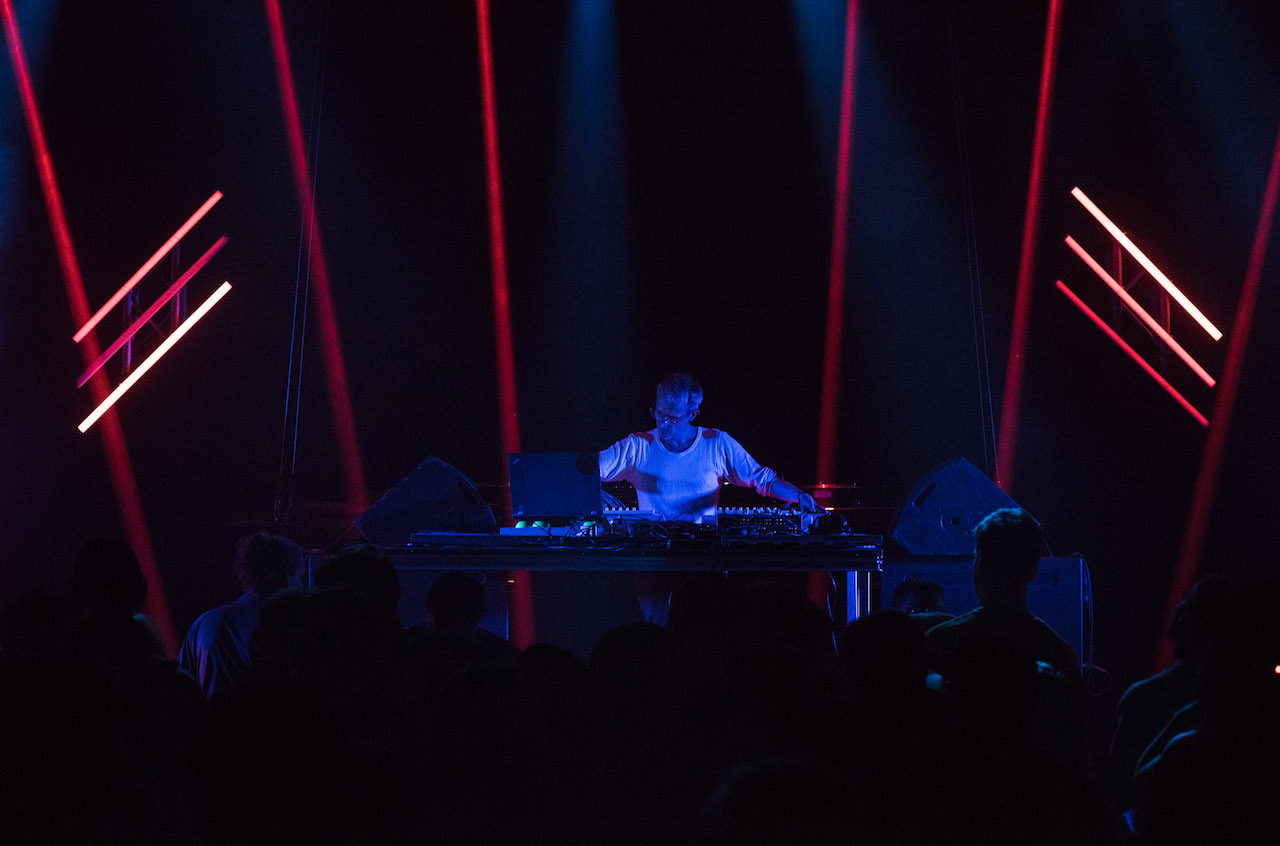- Graz may be Austria's second largest city, but if you find yourself wandering its picturesque streets in winter after dark, it can feel eerily deserted. By day, fur-clad Styrians roam about accompanied by their hounds, while after sunset, candlelit restaurants and bars offer a welcome refuge from the subzero temperatures. For the past 14 years, Graz has been home to Elevate Festival, a five-day conjunction of forward-thinking music, art and political discourse. Its relationship with We Are Europe—an EU-funded organisation dedicated to fostering European festival culture—ties Elevate to events such as Lyon's Nuits Sonores and TodaysArt in The Hague. Like those festivals, it's a sophisticated affair, one that feels appropriately suited to its home.
Each year, Elevate's discursive side is meticulously curated in accordance with a contemporary theme. This year's, "Risk/Courage," aimed to examine, in the festival's words, "what risk are we personally willing to accept for our beliefs?" Free to attend, the various panels and talks centred in on topics such as "Indigenous Resistance" and "Fearless Journalism." (The latter was moderated by Courage Foundation cofounder and Edward Snowden affiliate Sarah Harrison.) The biggest talking point, though, was the festival's controversial invitation to WikiLeaks founder Julian Assange, who spoke via livestream at the opening ceremony. (I got to Graz a day late, so missed the talk, but reports suggested that he evaded questions—which were collected from the Austrian public via national newspapers—and instead spoke at length about his ongoing asylum situation.)
Elevate uses half a dozen venues across Graz, none of which are more than 20 minutes apart. Aside from spotting the odd flyer or wristband, you'd never know the festival was taking place. I arrived at the city's 17th-Century mausoleum late on a sleepy Thursday evening. A small makeshift bar selling Glühwein was the only sign that Italian pianist Federico Albanese was performing an intimate, candlelit set inside. There was also Orpheum—an early '90s theatre in Graz's design quarter—which was home to live performances from the likes of Ben Frost & MFO, while an unassuming cafe in the snow-covered Stadtpark played host to early morning afterhours sessions featuring local DJs.
Perhaps Graz's most iconic landmark is Schloßberg, a tree-lined hill that dominates the landscape. Crowned with a fortress and a clocktower, this was where Elevate's late-night programming went down, spread across three underground venues. Dom Im Berg—an ex-WWII air bunker, carved deep into the mountain—was the most cavernous of the three and arguably the festival's centrepiece. Here, on Saturday evening, Jackmaster and Spencer hosted a Numbers party with Willow and Errorsmith. The latter's unique live show felt particularly at home in such a vast space, with the title cut from last year's Superlative Fatigue LP easily one of the weekend's best moments. Over on the other side of the mountain, Tunnel—long, thin, dark and sweaty—was Elevate's space for heads-down raving. Sets from Umfang, Objekt and Mike Servito shone here, with old Warp records (Rhythm Invention's remix of Jaco's "Show Some Love") falling alongside more recent tunes from Claro Intellecto and Killa P. Directly underneath Schloßberg's clocktower was Dungeon, a dimly-lit gravelled cave accessed via a short elevator ride. Though it was cold and damp, it had an intimacy that gave experimental live shows from the likes of Caterina Barbieri and Nurse With Wound an odd charm.
Temperatures as low as -10°C in the weeks leading up to the festival caused organisers to rethink Saturday's day party, which was due to take place at Kasematten, an open-air venue overlooking the city. Instead, the action was moved indoors to Orpheum's auditorium. An early start meant that when I arrived, at around 3 PM, Steffi was spinning to only a few dozen people. I perched on a ledge at the rear of the dance floor, swinging my legs and sipping pilsners as the Panorama Bar resident gradually lured people out of the shadows with her typical blend of punchy house and techno. To my left, an older couple looked on curiously, tapping their feet. To my right was a young family, the children marvelling at their surroundings from the side of the room as they watched their parents dance to Basic Soul Unit's remix of Herbert's "Deeper," DJ Sneak's remix of Auto Repeat's "Needle Damage" and tunes by Johannes Volk.
Sunday evening wound the weekend down nicely, with a closing concert for a few hundred people upstairs at Orpheum. As people milled about in the hallway, sipping drinks and sharing their highlights with friends and new acquaintances, Jimi Tenor—who was flown in last-minute from Helsinki to replace John Maus—casually ambled onstage, wearing a pink suit and reading over handwritten notes for his modular gear. I'd never seen Tenor before, but it was one of the best sets of the weekend. The first kick drums of 1996's "Take Me Baby," Tenor's closest thing to a hit, were met with cheers from fans as he took long swigs of champagne.
It's fair to presume that Elevate's crowd come for widely varying reasons. Some people I met engaged primarily with its discursive side, while others still couldn't get over the fact that DJ Deeon was playing in their hometown. Where Elevate shines, then, is in seamlessly catering to a broad demographic, fostering an atmosphere where academics and tech heads mingle casually alongside music nerds. Musically, it's a cut above, too, with bookings that stand out in among a sea of monotonous festival lineups. I'd implore anyone to go and not come away gushing about it.
Photo credit /
Johanna Lamprecht
Clara Wildberger
Hannah Antonia
David Visnjic
 Perhaps Graz's most iconic landmark is Schloßberg, a tree-lined hill that dominates the landscape. Crowned with a fortress and a clocktower, this was where Elevate's late-night programming went down, spread across three underground venues. Dom Im Berg—an ex-WWII air bunker, carved deep into the mountain—was the most cavernous of the three and arguably the festival's centrepiece. Here, on Saturday evening, Jackmaster and Spencer hosted a Numbers party with Willow and Errorsmith. The latter's unique live show felt particularly at home in such a vast space, with the title cut from last year's Superlative Fatigue LP easily one of the weekend's best moments. Over on the other side of the mountain, Tunnel—long, thin, dark and sweaty—was Elevate's space for heads-down raving. Sets from Umfang, Objekt and Mike Servito shone here, with old Warp records (Rhythm Invention's remix of Jaco's "Show Some Love") falling alongside more recent tunes from Claro Intellecto and Killa P. Directly underneath Schloßberg's clocktower was Dungeon, a dimly-lit gravelled cave accessed via a short elevator ride. Though it was cold and damp, it had an intimacy that gave experimental live shows from the likes of Caterina Barbieri and Nurse With Wound an odd charm. Temperatures as low as -10°C in the weeks leading up to the festival caused organisers to rethink Saturday's day party, which was due to take place at Kasematten, an open-air venue overlooking the city. Instead, the action was moved indoors to Orpheum's auditorium. An early start meant that when I arrived, at around 3 PM, Steffi was spinning to only a few dozen people. I perched on a ledge at the rear of the dance floor, swinging my legs and sipping pilsners as the Panorama Bar resident gradually lured people out of the shadows with her typical blend of punchy house and techno. To my left, an older couple looked on curiously, tapping their feet. To my right was a young family, the children marvelling at their surroundings from the side of the room as they watched their parents dance to Basic Soul Unit's remix of Herbert's "Deeper," DJ Sneak's remix of Auto Repeat's "Needle Damage" and tunes by Johannes Volk.
Perhaps Graz's most iconic landmark is Schloßberg, a tree-lined hill that dominates the landscape. Crowned with a fortress and a clocktower, this was where Elevate's late-night programming went down, spread across three underground venues. Dom Im Berg—an ex-WWII air bunker, carved deep into the mountain—was the most cavernous of the three and arguably the festival's centrepiece. Here, on Saturday evening, Jackmaster and Spencer hosted a Numbers party with Willow and Errorsmith. The latter's unique live show felt particularly at home in such a vast space, with the title cut from last year's Superlative Fatigue LP easily one of the weekend's best moments. Over on the other side of the mountain, Tunnel—long, thin, dark and sweaty—was Elevate's space for heads-down raving. Sets from Umfang, Objekt and Mike Servito shone here, with old Warp records (Rhythm Invention's remix of Jaco's "Show Some Love") falling alongside more recent tunes from Claro Intellecto and Killa P. Directly underneath Schloßberg's clocktower was Dungeon, a dimly-lit gravelled cave accessed via a short elevator ride. Though it was cold and damp, it had an intimacy that gave experimental live shows from the likes of Caterina Barbieri and Nurse With Wound an odd charm. Temperatures as low as -10°C in the weeks leading up to the festival caused organisers to rethink Saturday's day party, which was due to take place at Kasematten, an open-air venue overlooking the city. Instead, the action was moved indoors to Orpheum's auditorium. An early start meant that when I arrived, at around 3 PM, Steffi was spinning to only a few dozen people. I perched on a ledge at the rear of the dance floor, swinging my legs and sipping pilsners as the Panorama Bar resident gradually lured people out of the shadows with her typical blend of punchy house and techno. To my left, an older couple looked on curiously, tapping their feet. To my right was a young family, the children marvelling at their surroundings from the side of the room as they watched their parents dance to Basic Soul Unit's remix of Herbert's "Deeper," DJ Sneak's remix of Auto Repeat's "Needle Damage" and tunes by Johannes Volk.
 Sunday evening wound the weekend down nicely, with a closing concert for a few hundred people upstairs at Orpheum. As people milled about in the hallway, sipping drinks and sharing their highlights with friends and new acquaintances, Jimi Tenor—who was flown in last-minute from Helsinki to replace John Maus—casually ambled onstage, wearing a pink suit and reading over handwritten notes for his modular gear. I'd never seen Tenor before, but it was one of the best sets of the weekend. The first kick drums of 1996's "Take Me Baby," Tenor's closest thing to a hit, were met with cheers from fans as he took long swigs of champagne. It's fair to presume that Elevate's crowd come for widely varying reasons. Some people I met engaged primarily with its discursive side, while others still couldn't get over the fact that DJ Deeon was playing in their hometown. Where Elevate shines, then, is in seamlessly catering to a broad demographic, fostering an atmosphere where academics and tech heads mingle casually alongside music nerds. Musically, it's a cut above, too, with bookings that stand out in among a sea of monotonous festival lineups. I'd implore anyone to go and not come away gushing about it. Photo credit / Johanna Lamprecht Clara Wildberger Hannah Antonia David Visnjic
Sunday evening wound the weekend down nicely, with a closing concert for a few hundred people upstairs at Orpheum. As people milled about in the hallway, sipping drinks and sharing their highlights with friends and new acquaintances, Jimi Tenor—who was flown in last-minute from Helsinki to replace John Maus—casually ambled onstage, wearing a pink suit and reading over handwritten notes for his modular gear. I'd never seen Tenor before, but it was one of the best sets of the weekend. The first kick drums of 1996's "Take Me Baby," Tenor's closest thing to a hit, were met with cheers from fans as he took long swigs of champagne. It's fair to presume that Elevate's crowd come for widely varying reasons. Some people I met engaged primarily with its discursive side, while others still couldn't get over the fact that DJ Deeon was playing in their hometown. Where Elevate shines, then, is in seamlessly catering to a broad demographic, fostering an atmosphere where academics and tech heads mingle casually alongside music nerds. Musically, it's a cut above, too, with bookings that stand out in among a sea of monotonous festival lineups. I'd implore anyone to go and not come away gushing about it. Photo credit / Johanna Lamprecht Clara Wildberger Hannah Antonia David Visnjic